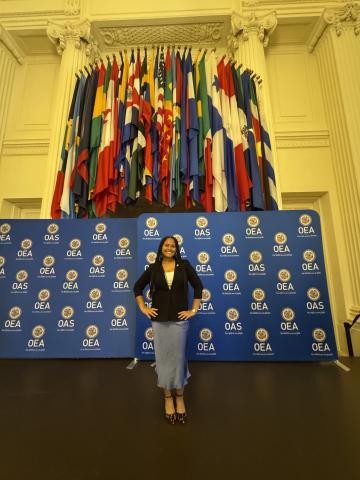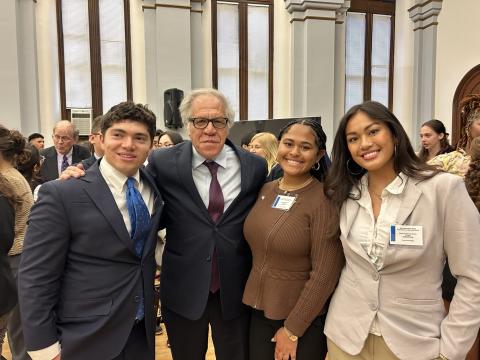Representing Argentina at the Washington Model OAS

My name is Aleyea Mogilles and this past April I was given the opportunity to participate in the Washington Model of the Organization of the American States. The Organization of American States, also known as the OAS, is the oldest international governmental body in the Western Hemisphere. I am a sophomore studying International Development and Africana Studies with a minor in Strategy, Leadership, and Analytics (SLAM). I have always been interested in international affairs and different international organizations. Throughout my academic career at Tulane, I have been in search of a class that provided me with a detailed and engaging course to learn more about these important organizations. Thanks to the Stone Center for Latin American Studies, I was allowed to explore my interests in international affairs by participating in the WMOAS conference.
Prior to the conference, my classmates and I became experts in the social, economic, and political stances of Argentina. Argentina is a unique country that has a wide range of political standpoints to take into account. The conference consists of engaging in discussions surrounding individual resolutions that participants, also known as delegates, wrote from their country’s perspective. With this being said, our resolution was required to effectively address an issue affecting Latin American countries while upholding the views of Argentina.
Each committee is given sub topics that delegates have the opportunity to write resolutions addressing issues whether that be social, political, or economic in the member states. The resolutions must be applicable to all countries and follow a specific format that mirrors the one used in the OAS. My partner and I chose to focus our resolution on incorporating gender perspectives into foreign policy. Some other topics that Tulane representatives focused on were the usage of AI in law enforcement and advocacy for disabled peoples throughout the region.
The conference was hosted at Trinity University, where delegates from around the world engaged in serious debates surrounding real issues facing people throughout the Western hemisphere. From the University of Colombia in Medellin to Providence College in Rhode Island, this conference gave us a chance to engage with people from a wide array of backgrounds. Some of my favorite memories were made passing notes to other delegates throughout the conference and eating lunch together after debates. My partner and I went out of our way to engage with as many people as we could and tried our hardest to represent our resolution as well as gain support.
This experience was truly life-changing and exposed me to a new city with new people. I have made lifelong friendships through this experience and I am forever grateful. The Washington Model OAS is a place for future leaders to excel and learn more about themselves. This experience taught me so much about how to engage in debate as well as the importance of procedures. I would recommend this experience to anyone who is invested in the future of international affairs and has an interest in policy or law. This experience will teach you things about yourself that can only be learned through hands-on learning. I would like to thank Professor Huck for selecting me to participate in this invaluable experience.

